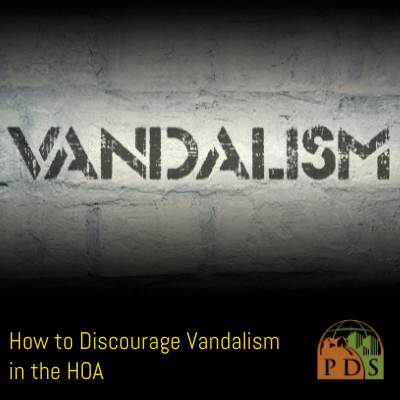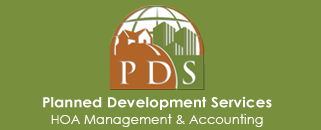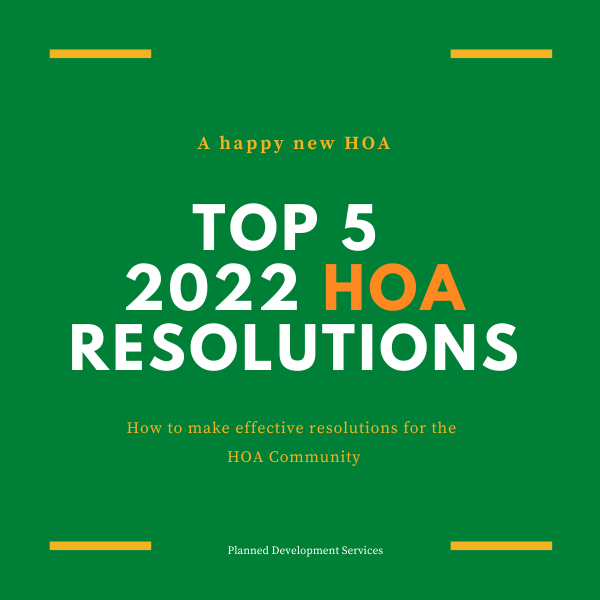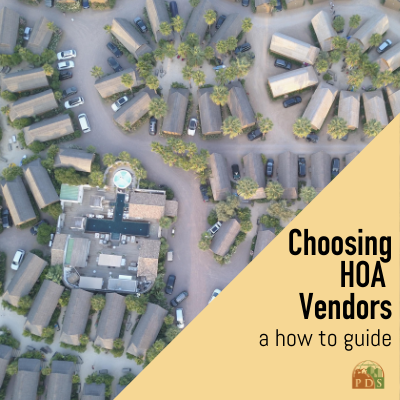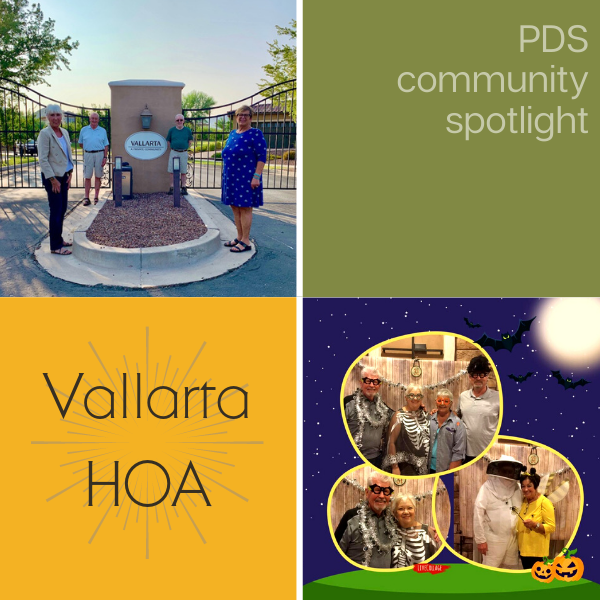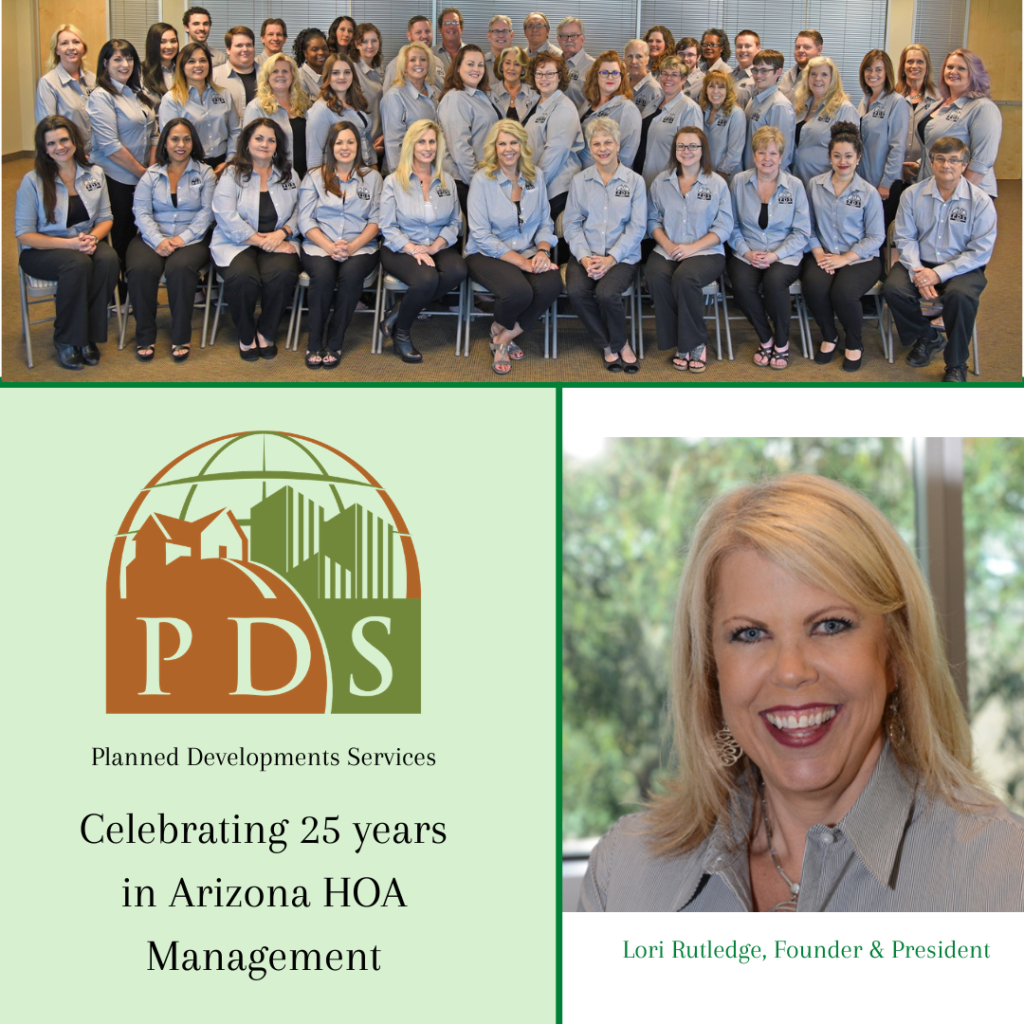Planned Development Services (PDS) is celebrating 25 years in HOA Management this month! We thought we would turn the mic to our Founder & President, Lori Rutledge….who is also our leader, coach, mentor, and friend. Let’s dive in and spend some time to learn more about her journey and how PDS has evolved.
Let’s start with an easy question that many people don’t actually understand, What is an HOA?
Lori: An HOA generally, with the help of a management company, oversees the management of various types of communities. Ie; townhouses, master planned communities, planned communities and condos. HOA’s were formed to assist cities with the managing of common areas as well as to protect the overall equity of the homeowner’s property.
Why did you decide to take over PDS? What was your inspiration?
Lori: I really liked the idea of HOAs, it is my belief that they are essential as they protect the equity of, and aesthetics in a community. The whole idea is to make sure that a person’s largest (in most cases) investment is protected and increases over time. An HOA is also to create a harmonious “community” for families to live in.
I’ve been in real estate at some level or another for thirty years, and this was an organic evolution for me.
How many HOA communities does PDS manage?
Lori: We have approximately 130 communities that we manage, with a total of about 35,000 doors.
How has PDS evolved since you founded it? What drove your evolution?
Lori: I think it (our evolution) happened organically….there was a need and we filled it. Most of our new business comes from referrals, so I like to think it’s because we are doing a great job. We know what we’re doing. We’ve created programs and plans that really work to help associations do better both financially and aesthetically.
What are some of the biggest lessons you have learned in HOA Management, that you would like to share?
Lori: I think the biggest lesson I’ve learned in the 20 plus years I’ve been running PDS is surrendering to the change! (Laughs). Things are going to change, and we really have to adapt. Nearly every year there are legislative changes that require us to adjust how we manage properties while still accomplishing our goal of making them great.
PDS has a lot of women in leadership, including yourself. Was that a conscious decision? If so, why? (we think it is remarkable).
Lori: Not really. This industry when I got into it was very male dominated. Most managers were men, most of the people in leadership were men.
I was raised by a very strong woman, so it’s just who I am. I don’t think there was a possibility for me to be anybody different.
I believe in working with people who want to make change, it doesn’t matter to me whether they are male or female. We’re a very philanthropic organization, which tends to be a big part of who we are and who we hire to work with us.
We were very small when I first purchased the company. I think there were seven of us, total. Now there are more than fifty of us! So we did everything back then. We would have mailing parties when a mailing had to go out, as we didn’t have fancy machines that did it for us back then. We had to stuff and lick envelopes. Really it was about people who respected that, that stayed with me. I’ve had people that have been with PDS the entire time, since the beginning. Our Chief Financial Officer worked for PDS when I bought the company and she’s still with us to this day.
I have no preference one way or the other – it (PDS) has just become what it has become. It’s just happened naturally that we have many women in leadership. It’s about being the type of employee that is willing to do whatever it takes. I hire to team work, maybe even more than qualifications. We only hire people that are willing to do whatever it takes to get the job done. Sometimes that means doing something that’s not in your job description, like emptying the trash or helping clean up after an event. We all work together to get whatever needs to be done, done.
How would you describe being a woman business owner today versus 25 years ago? Has anything changed?
Lori: It has changed so much! When I first started working it didn’t matter what position you held… back then it was absolutely a man’s world. There were very few women in charge.
I worked for a developer. I was the only woman on the management team of about 20 people. It never failed in any of those meetings that at least one or two men would ask me to get them a cup of coffee.
It was just the world we lived in. If you got pregnant, which I did 30 years ago, the fear was that you just couldn’t handle the job, so you worked twice as hard to prove yourself. I hope that the people who work for me, whether they are male or female, don’t feel like they have to do that.
It feels different (now). Sexual harassment back then was crazy! You just had to ignore it for the most part. There is less of that (sexual harassment) now. The glass ceiling has shattered, a bit. It’s still there but not in my company 😊
It certainly isn’t perfect, but it is a thousand times better than it used to be.
Why is this work important?
Lori: I think we are protecting people’s property values. People matter to me, so the business matters. This is the largest investment for most people, so I do believe we make a difference.
What do you think most people misunderstand about HOAs?
Lori: I think there is a communication problem in the industry. I’ve fired my share of HOA Boards due to a lack of communication. I believe we’re a partnership, the HOA Board, the homeowners, and the entire community. If I have a Board that wants to consider our relationship adversarial and not in partnership, we just cannot continue to work with them. I also have worked with many HOA Boards that believe they are the trash can police and want to rule their communities, rather than work with their homeowners as a team. This never ends up well, so I strive to encourage partnership above all else.
That’s the goal of all of this. We work with HOA Boards, we educate them. We do bi-monthly Board classes where we talk about having a more reasonable perspective, as opposed to being the big bad HOA. That’s not what we’re out there to do.
We’re not the police. We’re not there to solve every problem, but we are there to work with them to create a great community.
How is PDS different from other Arizona HOA Management Companies?
Lori: We have an employee-driven culture. That sounds kind of strange, because we should be thinking of our bottom line for our community associations, right? But when I take care of my employees – this is a really difficult business (people don’t usually call to thank us). If I focus on my employees, they have a great life with this company, and their experience is excellent, they will pass that on to our customers. Therefore, I focus on my employees, I focus on the experience that they have, I encourage them to pass that on to our clients and to our customers, as well as giving back to our community
We look at it as a whole picture. When somebody calls us and has a problem, for example they aren’t working because of the pandemic, we’re going to work with them.
(Our clients) don’t get a recording when they call. They get live people who transfer them to live people, not a voicemail. This is essential to our business model. We call it “Solution Hotline,” because we want to be providing solutions. One of the most challenging things about the HOA industry is communication.
It makes sense, if I’m a manager – I’m out in the field a lot. I’m not sitting at my desk waiting for the phone to ring. Our solution to that is that each of our employees dedicates a certain amount of time to the phones. We have very experienced managers in this industry, so if someone calls and has a standard question, anyone answering the phone here is very well-versed in answering those questions.
What I take the most pride in is, when people are ready to get off the phone, and they ask, “Is there anything else I can help you with?” Eighty-five percent of the time the answer is “no, thank you, I really appreciate that I could talk to a live person and get my question answered.”
We put that in place about ten years ago. I’m so proud of that.
We have a huge database of all the HOAs and their policies so that anyone answering the phone can answer just about any question.
It sounds so simple! Not simple to implement, I’m sure…
Lori: It is simple. You answer the phones, you answer the questions.
What would you like to evolve in the industry and with PDS in the next 25 years?
Lori: The biggest thing I want to see continue to evolve and grow is education, because when managers, board members and homeowners are educated, the more they understand what they can and cannot do, and the more they understand why we do what we do. I think that’s really essential.
We offer frequent educational opportunities for our Board members, but usually the same 40 to 50 people show up, and we have 500 in our portfolio. So we’re looking to do more quick learning opportunities, more YouTube videos and what not, about the Arizona HOA laws, federal laws, the documents that were created, so people can understand why we do what we do and how we do it. Then the Board members can educate the homeowners, and there’s less frustration.
Education is a good thing. I’d like to see a lot more of that.
I would also like to see more education for policymakers, so they understand how new and changing legislation impacts homeowners and associations in Arizona.
Is there anything else we should know?
Lori: I really feel honored to be a part of something bigger, because this is something bigger. I want to continue our philanthropic work, like feeding the hungry and donating water in the Summer…. Etc. For me, it’s not enough to be a company. We have to do, and be something bigger. That’s something we always strive for and I want to continue to do that.
